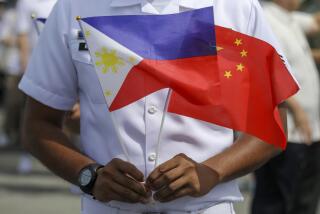From the Archives: China Teeters on Edge of Civil War as Rival Forces Mobilize
BEIJING -- China teetered this morning on the edge of civil war, with troops presumed loyal to hard-line President Yang Shangkun in control of central Beijing but positioned defensively at strategic points in apparent anticipation of attack by rival forces.
Troops and armored vehicles were reported moving toward Beijing from the east, according to Western diplomats who said they appeared to be opposed to the troops of the 27th Army that killed hundreds or perhaps thousands of people while taking control of the center of the capital over the weekend.
A military attache in the British colony of Hong Kong, reached by telephone this morning, said the Chinese air force has joined the effort to wrest control of Beijing Faxes from the 27th Army. Infantry units of the air force landed at the Nanyuan military airport south of the capital Monday night and engaged in skirmishes with other military units at or near the airport, the attache said.
The air force believes that responsibility for the indiscriminate shootings in Beijing rests with the army, the attache said. The air force is headed by Wang Hai, who canceled a planned trip to Europe last week apparently to remain in Beijing during the intra-military feuding.
Other small-scale duels broke out between rival troops Monday, according to Western witnesses, only about one mile west of Tian An Men Square, now controlled by thousands of 27th Army soldiers with hundreds of armored vehicles.
Tanks Fan Out
At about 7 p.m. Monday, tanks accompanied by armored personnel carriers and truckloads of troops fanned out to points along the Second Ring Road that loops around the main part of the city. This area includes Tian An Men Square, the Great Hall of the People and Zhongnanhai, the red-walled compound from which China’s leaders have traditionally ruled, and the city’s older residential and commercial districts.
About 20 tanks continued to stand guard this morning at the Jianguomen bridge on the eastern side of the city, about half facing east in defensive positions. The others faced north, south and west to control access to the strategically important bridge, which crosses the Second Ring Road.
What was unfolding appeared to be a battle for control of Beijing and, in the broader sense, for control of China after the country’s 84-year-old paramount political and military leader, Deng Xiaoping, passes from the scene. China’s political leadership appeared to be in a virtual state of collapse, almost paralyzed by personal rivalries and differences over the use of force and terror against Beijing citizens.
Deng is generally believed to have ordered the bloody military crackdown, but he is also believed to be in rapidly failing health. It is widely believed that he suffers from prostate cancer. But there have also been rumors that he has suffered a stroke or died since his last appearance in public, which was the May 16 summit meeting with Soviet President Mikhail S. Gorbachev.
The troops now in control of central Beijing are more directly associated with Yang and high-ranking military members of his family. It appeared that the Chinese president, a veteran military leader in better health than Deng, was making a bid for supreme power.
Attempted Coup Seen
Some observers theorized that either President Yang had attempted to carry out a coup and Deng was succeeding in putting it down, or that Deng himself was responsible for ordering the carnage but had realized that the situation nationwide was getting out of control and was looking for scapegoats.
But one Chinese military source said that Deng, whose whereabouts are unknown, had not been in control of the military when the weekend massacre took place. This source said Deng is now believed to be reasserting control.
Some reports said that the 38th Army, a Beijing-area force that reputedly refused orders to suppress the pro-democracy demonstrations that touched off the current crisis, was being ordered to retake the city from the troops that moved in over the weekend. The 38th Army is believed to have strong ties to the reformist general secretary of the Communist Party, Zhao Ziyang. Zhao appears to have been stripped of power for his refusal to take a hard line with the students. His current fate is unknown but he has been presumed to be under house arrest.
Some Troops Unwilling
Within Beijing, there were various indications that not all troops were willing to participate in the martial-law crackdown ordered by hard-line Premier Li Peng on May 20.
About 100 military vehicles, including armored personnel carriers and troop trucks, were abandoned by soldiers on the west side of the city during the predawn hours Monday and later set afire by residents. Crowds around the charred vehicles reported that the soldiers who had left them and taken refuge at a nearby museum compound had said they were unwilling to fire on unarmed crowds.
Closer to the city center, shooting broke out between two groups of troops near the Minzu Hotel, only about one mile west of Tian An Men Square.
Western diplomats who spoke to reporters for the news agency United Press International said that later in the day they saw two armored personnel carriers engage in a machine-gun duel at the same location, sending bullets through fifth-floor windows of the tourist hotel.
Troops apparently supporting the martial-law crackdown set up cordons across two main roads near the city’s northwest campus district Monday, UPI reported.
A Hong Kong newspaper reported today that an officer on guard at Beijing’s Great Hall of the People fired four shots at Premier Li on Sunday afternoon but that the Chinese leader escaped with only a slight wound.
The Associated Press quoted the daily Ming Pao as saying the young guard fired from a distance and Li was hit in the thigh.
The newspaper, quoting unidentified sources, said the guard was killed immediately and about 170 other guards at the Great Hall were quickly disarmed.
Throughout many parts of the city, citizens erected barricades of buses, trucks, metal-and-concrete street dividers and vegetable market stalls. Citizens stood guard at intersections, many of which were virtually impassable.
The lack of transportation and an eerie tension on the streets kept most workers at home away from their jobs Monday and today. Most stores remained closed and there was worry that food shortages may soon crop up. Relatively few Beijing residents keep stores of food on hand because of a lack of refrigerators. Panic buying of food supplies began to break out.
“We have dried noodles, but that is about all. And we’re almost out of cooking oil,” complained a homemaker standing in a long line at a vegetable stand near the Temple of the Sun park.
In the old neighborhoods near Tian An Men Square, soldiers were seen Monday running into alleyways and shooting at fleeing residents. One witness said that a teen-age girl was shot in the chest near Tian An Men.
Rifle shots could be heard from the direction of the square in the evening, and a building was set afire on Xidan street and Changan Avenue to the west of the huge central open space.
The U.S. Embassy said an American was hospitalized with head injuries received Sunday morning when he was beaten by security forces clearing demonstrators from Tian An Men Square. He was not identified.
Confirmed deaths, based on figures provided by hospitals and bodies seen by foreign witnesses, number about 400, but it is widely believed that at least 1,000, and perhaps many more have died.
A spokesman for the Chinese Red Cross, which had displayed some sympathy for the student protesters in the square, said that the death toll “is in the thousands.”
“Obviously it’s going to be impossible to ever know,” he added.
An unsubstantiated report circulated among students at Beijing University that four truckloads of dead were moved over the weekend from Tian An Men Square to the main crematorium at Babaoshan Cemetery in western Beijing.
Reports from other areas of China on Monday indicated that the situation was chaotic in many other cities outside Beijing.
Posters in Shanghai carried the message “The Blood Has Been Shed,” referring to the weekend violence in Beijing. Protesters blocked traffic virtually throughout the city, an official at the U.S. Consulate said. The Shanghai municipal government warned that it would take “strong measures” unless the streets were cleared.
Situation in Shanghai
The situation in Shanghai further deteriorated in the evening, with authorities warning that they were about to move against the throngs of residents in the streets.
Charles Sylvester, the U.S. consul general in Shanghai, told The Times in a telephone interview this morning that the city government had telephoned all consulates Monday night and warned them to keep their citizens away from the famous downtown Bund area, People’s Square and the universities.
Throughout the night, rumors spread of the impending imposition of martial law, but dawn arrived with no such announcement, he said.
“We’ve also had a lot of panic buying here of rice, oil and other food staples,” he added.
Cars Overturned in Chengdu
In Chengdu in Sichuan province, a diplomat reported that cars of Chinese officials were being overturned.
The government continued to insist that the bloody crackdown in Beijing was necessary to crush “a counterrevolutionary rebellion.”
A statement issued Monday in the name of the State Council, China’s Cabinet, and the Communist Party Central Committee, blamed the violence in Beijing on “supporters of bourgeois liberalization”--a code phrase for Western concepts of democracy and individual freedoms--foreign governments, hooligans and remnants of radical leftist supporters of the 1966-1976 Cultural Revolution.
SCATTERED SKIRMISHES REPORTED AS CRISIS DEEPENS IN BEIJING
The situation in China, a country that increasingly seemed to be on the edge of civil war Monday:
Forces presumed loyal to hard-line President Yang Shangkun controlled central Beijing but were in defensive positions in apparent anticipation of attack by rival units.
Troops and armored vehicles were reported moving toward Beijing from the east. They were described as opposed to the forces that killed hundreds of citizens over the weekend.
Tanks and troops fanned out to secure the downtown area that includes Tian An Men Square, the Great Hall of the People and Zhongnanhai, the compound where China’s rulers live.
Meanwhile, unrest and disorder were reported in other Chinese cities:
In Shanghai, protesters blocked traffic virtually throughout the city, and the municipal government warned that it would take “strong measures” unless the streets were cleared.
In Chengdu in Sichuan province, a diplomat reported that cars of Chinese officials were being overturned.
In Hangzhou and Wuhan, protesters sat on rail lines, blocking trains to Shanghai and a main north-south line.
Times staff writer Jim Mann also contributed to this article.
More to Read
Sign up for Essential California
The most important California stories and recommendations in your inbox every morning.
You may occasionally receive promotional content from the Los Angeles Times.










